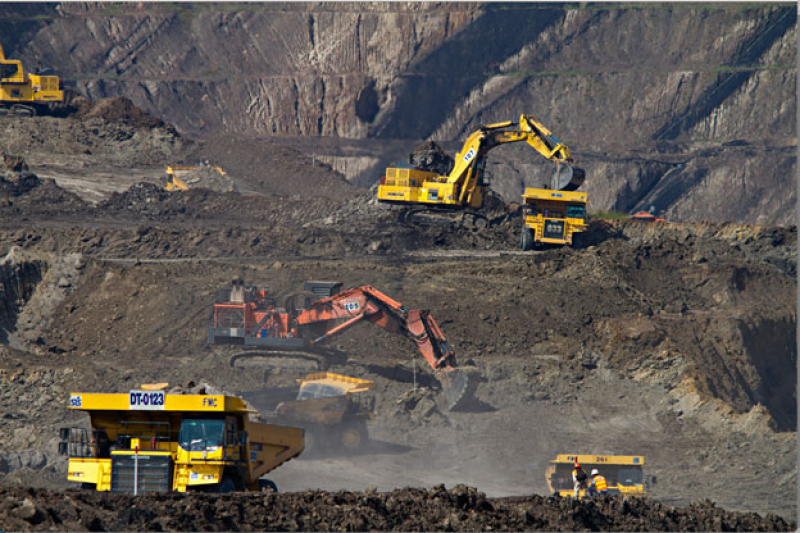- Can Dhaka’s arms recovery drive ensure peaceful polls? |
- ‘Unhealthy’ air quality recorded in Dhaka Monday morning |
- BD peacekeepers' deaths: UN chief calls Dr. Yunus, offers condolence |
- Bangladesh Plans Rockets, Satellites, and Space Industrial Park |
- India willing to work together inspired by shared sacrifices of past |
Economic Growth Is the Wrong Metric for Our Time

Indonesia’s largest coal mining company in operation. Even “green” energy requires destructive mining for trace minerals. Credit: Dominik Vanyi
As the United States veers toward isolationism and authoritarianism, the resulting political instability is now rippling into economic anxiety. Many fear that Trump’s policies — particularly his erratic trade and tariff decisions — could derail economic growth both at home and abroad.
The United Nations has forecast a slowdown in global economic growth, largely due to these disruptive policies. While Wall Street briefly rallied after a partial suspension of U.S. tariffs, the underlying indicators tell a grimmer story. The U.S. GDP contracted by 0.3% in the first quarter, and credit rating agency Moody’s downgraded the country’s outlook, citing rising debt and a deteriorating debt-to-GDP ratio.
For decades, GDP has been treated as the gold standard for measuring a society’s success. Yet it includes activities that are hardly indicators of well-being — from military build-ups to oil spill cleanups and prison construction. This blind allegiance to "growthism" goes largely unchallenged in policymaking, even though it fails to measure the health of people or the planet.
Worse, the pursuit of relentless growth ignores the most pressing crises of our time: climate change, ecosystem collapse, and pollution. These are not side effects — they are direct consequences of an economic model addicted to expansion and extraction. Our current trajectory threatens not only the human species but the millions of others with whom we share the Earth.
More than a poor proxy for progress, economic growth has become a misleading indicator of economic health itself. Over the past few decades, most gains from growth have flowed to the wealthiest 1%, while overall growth in developed nations has stagnated. Meanwhile, global debt is exploding.
To understand this decline, we must confront a fundamental truth: modern economies are built on the foundation of cheap energy. Roads, bridges, airports, electrical grids — the very infrastructure of modern life — was built during an era of easy fossil fuel access and abundant materials. That era is ending.
The infrastructure we once built cheaply now demands expensive maintenance, on top of new construction to support expanding populations. Yet the raw materials — from fossil fuels to minerals — are harder and costlier to obtain. Debt continues to rise, acting as a claim on increasingly scarce future resources.
Compounding the crisis are climate disasters, which are growing more frequent and expensive. Rising homeowners’ insurance rates, driven by fire, flood, and storm damage, are making basic needs like housing even more unaffordable.
Despite all this, mainstream economic discourse remains fixated on growth. Few question whether it’s viable — or desirable — in an age of ecological overshoot. Policymakers and pundits speak glowingly of a “green energy transition” without acknowledging that electricity accounts for only 20% of global energy use. The production of cement, steel, fertilizer, and plastics — critical to modern economies — remains heavily dependent on fossil fuels and cannot currently be decarbonised at scale.
Even renewable technologies come at an environmental cost. Manufacturing solar panels, wind turbines, and electric vehicles requires enormous quantities of metals like lithium, cobalt, and rare earth elements. Mining these materials devastates ecosystems, contaminates water supplies, exploits child labour, and consumes vast amounts of fossil energy.
This is not an energy transition. It is an energy addition. Since 2000, despite surging investment in renewables, global coal use has risen by 80%. This is not a sign of progress — it's a warning.
Proponents of growth cling to the belief in technological salvation. But according to many metrics, innovation is slowing. Breakthroughs in essentials like food, housing, and healthcare have failed to materialise, leaving the cost of living stubbornly high. As venture capitalist Peter Thiel famously put it, we were promised flying cars — instead, we got 140 characters.
Artificial intelligence is now seen as the next great engine of growth, with promises of miraculous efficiencies and new resource discoveries. But so far, AI has not delivered real breakthroughs in energy or materials science. In fact, the data centers powering AI require massive amounts of electricity and billions of gallons of water — another hidden toll on already strained ecosystems.
There may still be ways to squeeze marginal growth from a system already in overshoot, but they will come at great cost — especially to the world’s poorest people, who are most vulnerable to environmental degradation and economic exploitation.
Is this really the best way to improve human well-being?
The question we must confront is no longer how to perpetuate growth. It is whether we can avoid collapse — economic, ecological, and humanitarian. Can we summon the wisdom to choose simplicity over excess, and community over consumption?
The time has come to envision a future built not on endless extraction, but on regeneration. Continued economic growth may benefit the few at the top. But a conscious, intentional contraction — a downshift to sustainable scale — could secure a decent life for all.
The choice is ours. And it is urgent.
Kirsten Stade is a conservation biologist and Lead Writer at the NGO Population Balance. Alan Ware is a researcher and writer who co-hosts Population Balance’s OVERSHOOT podcast.

